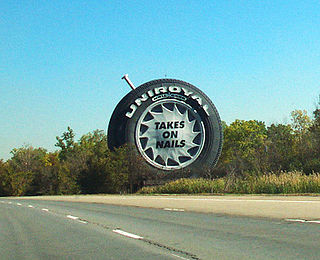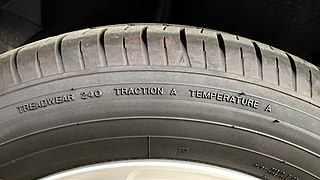
A tire or tyre is a ring-shaped component that surrounds a wheel's rim to transfer a vehicle's load from the axle through the wheel to the ground and to provide traction on the surface over which the wheel travels. Most tires, such as those for automobiles and bicycles, are pneumatically inflated structures, providing a flexible cushion that absorbs shock as the tire rolls over rough features on the surface. Tires provide a footprint, called a contact patch, designed to match the vehicle's weight and the bearing on the surface that it rolls over by exerting a pressure that will avoid deforming the surface.

Bridgestone Corporation is a Japanese multinational manufacturing company founded in 1931 by Shojiro Ishibashi (1889–1976) in the city of Kurume, Fukuoka, Japan. The name Bridgestone comes from a calque translation and transposition of ishibashi (石橋), meaning 'stone bridge' in Japanese. It primarily manufactures tires, as well as golf equipment.

The Goodrich Corporation, formerly the B.F. Goodrich Company, was an American manufacturing company based in Charlotte, North Carolina. Founded in Akron, Ohio in 1870 as Goodrich, Tew & Co. by Dr. Benjamin Franklin Goodrich, the company name was changed to the "B.F. Goodrich Company" in 1880, to BFGoodrich in the 1980s, and to "Goodrich Corporation" in 2001. Originally a rubber manufacturing company known for automobile tires, the company diversified its manufacturing businesses throughout the twentieth century and sold off its tire business in 1986 to focus on its other businesses, such as aerospace and chemical manufacturing. The BFGoodrich brand name continues to be used by Michelin, who acquired the tire manufacturing business in 1988. Following the acquisition by United Technologies in 2012, Goodrich became a part of UTC Aerospace Systems.

The Goodyear Tire & Rubber Company is an American multinational tire manufacturer headquartered in Akron, Ohio. Goodyear manufactures tires for passenger vehicles, aviation, commercial trucks, military and police vehicles, motorcycles, RVs, race cars, and heavy off-road machinery. It also licenses the Goodyear brand to bicycle tires manufacturers, returning from a break in production between 1976 and 2015. As of 2017, Goodyear is one of the top four tire manufacturers along with Bridgestone (Japan), Michelin (France), and Continental (Germany).
A brake run on a roller coaster is any section of track that utilizes some form of brakes to slow or stop a roller coaster train. There are various types of braking methods employed on roller coasters, including friction brakes, skid brakes, and magnetic brakes. The most common is a fin brake, an alternative name for a friction brake, which involves a serious of hydraulic-powered clamps that close and squeeze metal fins that are attached to the underside of a coaster train. Roller coasters may incorporate multiple brake runs throughout the coaster's track layout to adjust the train's speed at any given time.

The Tweel is an airless tire design developed by the French tire company Michelin. Its significant advantage over pneumatic tires is that the Tweel does not use a bladder full of compressed air, and therefore cannot burst, leak pressure, or become flat. Instead, the Tweel's hub is connected to the rim via flexible polyurethane spokes which fulfil the shock-absorbing role provided by the compressed air in a traditional tire.

Butyl rubber, sometimes just called "butyl", is a synthetic rubber, a copolymer of isobutylene with isoprene. The abbreviation IIR stands for isobutylene isoprene rubber. Polyisobutylene, also known as "PIB" or polyisobutene, (C4H8)n, is the homopolymer of isobutylene, or 2-methyl-1-propene, on which butyl rubber is based. Butyl rubber is produced by polymerization of about 98% of isobutylene with about 2% of isoprene. Structurally, polyisobutylene resembles polypropylene, but has two methyl groups substituted on every other carbon atom, rather than one. Polyisobutylene is a colorless to light yellow viscoelastic material. It is generally odorless and tasteless, though it may exhibit a slight characteristic odor.

Polybutadiene [butadiene rubber, BR] is a synthetic rubber. It offers high elasticity, high resistance to wear, good strength even without fillers, and excellent abrasion resistance when filled and vulcanized. "Polybutadiene" is a collective name for homopolymers formed from the polymerization of the monomer 1,3-butadiene. The IUPAC refers to polybutadiene as "poly(buta-1,3-diene)". Historically, an early generation of synthetic polybutadiene rubber produced in Germany by Bayer using sodium as a catalyst was known as "Buna rubber". Polybutadiene is typically crosslinked with sulphur, however, it has also been shown that it can be UV cured when bis-benzophenone additives are incorporated into the formulation.

The company formerly known as the United States Rubber Company, now Uniroyal, is an American manufacturer of tires and other synthetic rubber-related products, as well as variety of items for military use, such as ammunition, explosives, chemical weapons and operations and maintenance activities (O&MA) at the government-owned contractor-operated facilities. It was founded in Naugatuck, Connecticut, in 1892. It was one of the original 12 stocks in the Dow Jones Industrial Average, and became Uniroyal, Inc., as part of creating a unified brand for its products and subsidiaries in 1961.

Brembo S.p.A. is an Italian manufacturer of automotive braking systems, especially for high-performance cars and motorcycles. Its head office is in Curno, Bergamo, Italy.
Federal-Mogul Corporation is an American developer, manufacturer, and supplier of products for automotive, commercial, aerospace, marine, rail, and off-road vehicles, as well as industrial, agricultural, and power-generation applications. It was acquired in February 2022 by Apollo Global Management.
Hitachi Cable, Ltd. is a Japanese electric wire and cable manufacturing company. It was formed from Hitachi Densen Works, the Hitachi Works spin-off previously known as Densen Works.

Uniform Tire Quality Grading, commonly abbreviated as UTQG, is a set of standards for passenger car tires that measures a tire's treadwear, temperature resistance and traction. The UTQG was created by the National Highway Traffic Safety Administration in 1978, a branch of the United States Department of Transportation (DOT). All passenger car tires manufactured for sale in the United States since March 31, 1979 are federally mandated to have the UTQG ratings on their sidewall as part of the DOT approval process, in which non-DOT approved tires are not legal for street use in the United States. Light truck tires are not required to have a UTQG. It is not to be confused with the tire code, a supplemental and global standard measuring tire dimensions, load-bearing ability and maximum speed, maintained by tire industry trade organizations and the International Organization for Standardization.
A tubeless tire is a pneumatic tire that does not require a separate inner tube.
Sumitomo Electric Industries, Ltd. is a manufacturer of electric wire and optical fiber cables. Its headquarters are in Chūō-ku, Osaka, Japan. The company's shares are listed in the first section of the Tokyo, Nagoya Stock Exchanges, and the Fukuoka Stock Exchange. In the period ending March 2021, the company reported consolidated sales of US$26,5 billion.
Dunlop Ltd. was a British multinational company involved in the manufacture of various natural rubber goods. Its business was founded in 1889 by Harvey du Cros and he involved John Boyd Dunlop who had re-invented and developed the first pneumatic tyre. It was one of the first multinationals, and under du Cros and, after him, under Eric Geddes, grew to be one of the largest British industrial companies. J. B. Dunlop had dropped any ties to it well before his name was used for any part of the business. The business and manufactory was founded in Upper Stephens Street in Dublin. A plaque marks the site, which is now part of the head office of the Irish multinational departments store brand, Dunnes Stores.
Braided stainless steel brake lines are flexible hoses fitted to a hydraulic brake system. The intent of braided stainless steel brake lines is to improve brake system effectiveness and longevity as compared to an equivalent system fitted with flexible rubber hoses through near-elimination of hose expansion.

Tokai Carbon Co., Ltd. is a Japanese company. The company is a developer and stockist of graphite material for use in nuclear power, particularly electrical discharge machining electrode, high temperature, and mechanical applications.
Ansell is an Australian company which manufactures protective industrial equipment and medical gloves.

Lehigh Technologies is a specialty materials company that manufactures micronized rubber powders (MRP). Based in Atlanta, Georgia, Lehigh Technologies operates a MRP manufacturing plant at its headquarters, with an annual production capacity of more than 100 million pounds. Lehigh also operates a MRP research, and development facility, its Application & Development Center.











